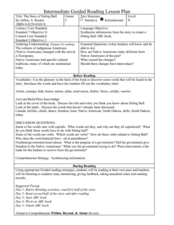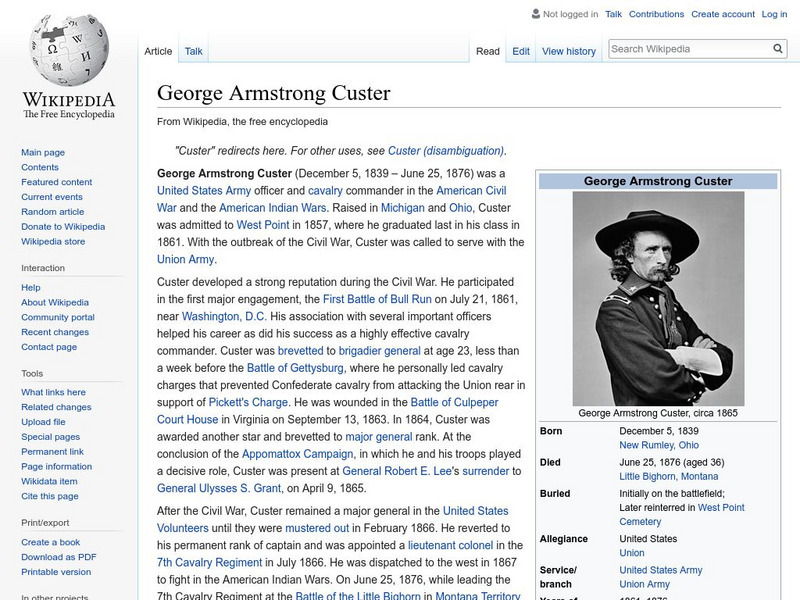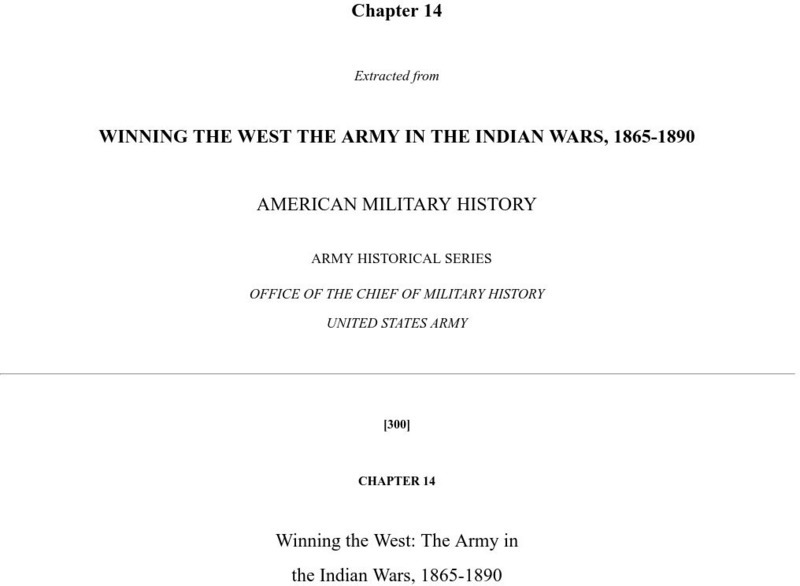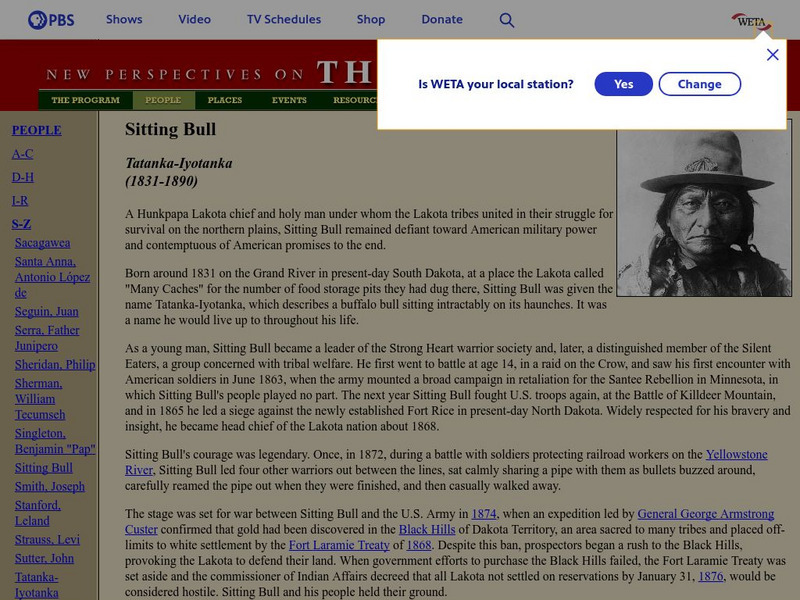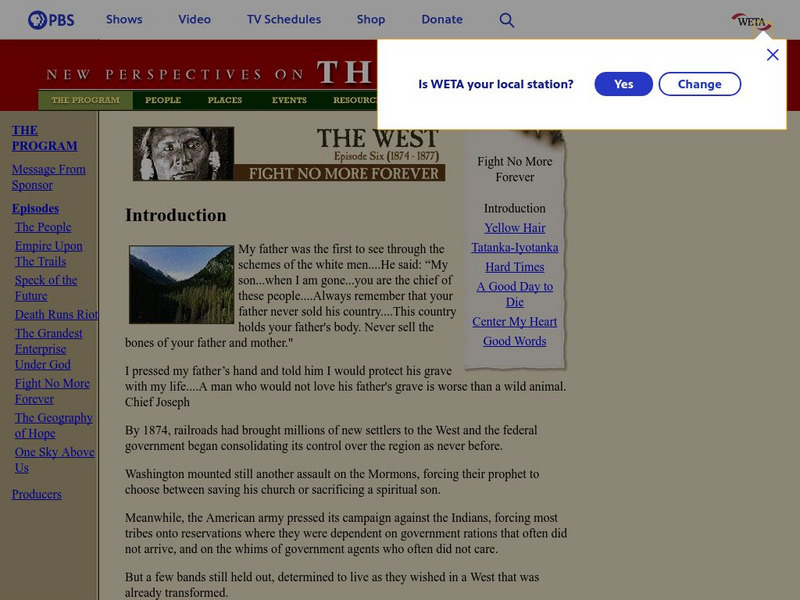Curated OER
Analyzing Primary and Secondary Sources to Assess the Decisions and Policies of Sitting Bull, Red Cloud, and the U.S. Government
Students examine U.S. policies regarding Native Americans. In this Native American history lesson, students analyze provided primary and secondary sources concerning Red Cloud, Sitting Bull, and the Dawes Act. Students use the provided...
Curated OER
The Story of Sitting Bull
Students complete activities with the book The Story of Sitting Bull by Jeffrey A. Rucker. In this literature lesson, students review new vocabulary and practice finding capital letters. They read the story, answer...
Curated OER
Internet Leaders Scavenger Hunt
In this leaders scavenger hunt worksheet, students research 10 different leaders important to history. First, they read each questions to determine who they need to search for using the Internet. Then, students write their response in a...
Wikimedia
Wikipedia: George Armstrong Custer
This site from Wikipedia provides extensive information about the life of General George Custer, and gives details of his military career and his defeat at the Battle of Little Bighorn.
PBS
Pbs: New Perspectives on the West
This in-depth resource presents a history of the American West from pre-Columbian times until World War I with profiles, documents, and images. It encourages visitors to link these into patterns of historical meaning for themselves....
Other
Indigenous Peoples' Literature: Chief Sitting Bull
This site is an excellent resource on Sitting Bull. Not only does it include some famous quotes by him and an overview of his life, but it also contains a first-person account of his life which contains many interesting obscure facts and...
Other
The Weekly South Dakotan: South Dakota History for 4th Grade
From the very beginning and through the twentieth century, this comprehensive collection of lessons will enrich students studying the history in between and the effects on South Dakota.
Other
Lumen Learning: Encroachment and Resistance
In the latter part of the 1800s, settlers began to ignore treaties when expanding westward. The government followed suit by declaring they would no longer negotiate new treaties, that they had the power to enforce laws on reservation...
Stanford University
Sheg: Document Based History: Reading Like a Historian: Battle of Little Bighorn
[Free Registration/Login Required] Students solve a problem surrounding a historical question by reading primary source documents. This historical inquiry lesson allows students to explore causes of the Battle of Little Bighorn by...
The Newberry Library
Newberry Library: Imagining the American West in the Late Nineteenth Century
Learning modules with primary resources explores how the West has been imagined as both America's manifest destiny and a wild frontier and examines the ways American Indian art and literature challenge these popular narratives.
Utah Education Network
Uen: Themepark: Liberty: Native Americans
Find a large collection of internet resources organized around Native Americans. Links to places to go, people to see, things to do, teacher resources, and bibliographies.
PBS
Pbs Learning Media: Sitting Bull: Spiritual Leader and Military Leader
Through two primary source activities and a short biographical video, students will understand the remarkable courage of this leader who stood up for his people.
Other
Joseph Bruchac Home Page: Joseph Bruchac
This site is Joseph Bruchac's homepage. It provides links to his biography, a listing of his major works, and other online resources for the author. It also provides links to several of his poems to open or download on mp3.
US Army Center
U.s. Army Center of Military History: Winning the West: The Army in the Indian Wars
This is a chapter excerpt from a book on military history which details the role of the United States Army in the Indian Wars for the years 1865 to 1890.
PBS
The West: Sitting Bull Tatanka Iyotanka
This is a biography of Lakota Indian Chief Sitting Bull who led his tribe in the Battle of the Little Bighorn against General George Custer.
PBS
Pbs the West: Fight No More Forever (1874 1877)
From the PBS critically acclaimed series, "The West" comes this introduction to the Indian Wars that were waged in the course of settling the frontier.
A&E Television
Biography: 12 Influential Native American Leaders
Here are a dozen Native Americans who left a lasting mark with their leadership, bravery and innovations.
A&E Television
History.com: 10 Things You May Not Know About Sitting Bull
Get the facts about one of the most legendary Native Americans of the 19th century. Sitting Bull was born around 1831 into the Hunkpapa people, a Lakota Sioux tribe that roamed the Great Plains in what is now the Dakotas.
Curated OER
National Park Service: Archeology at the Battle of the Little Bighorn
This site from the Midwest Archaeological Center provides general information on the Battle of the Little Bighorn, with additional information derived from modern excavations at the battle site.
American Indian Heritage Foundation
American Indian Heritage Foundation: Crazy Horse: Tashunkewitko
A beautiful and touching biography of Crazy Horse told by Charles A. Eastman (Ohiyesa), a Sioux scholar.
PBS
Pbs the West: Looking Glass: Allalimya Takanin (1832 1877)
A biography of Nez Perce Chief Looking Glass who led his band to the Big Hole Basin where they were unexpectedly attacked by U.S. army troops.
PBS
Pbs the West: Big Foot (?? 1890)
This article focuses on the massacre of Chief Big Foot and his followers at the Massacre of Wounded Knee.
Other
Powerful People: Sitting Bull: Hunkpapa Sioux (1831 1890)
Contains limited biographical information about Sitting Bull, as well as quotes from Chief Sitting Bull.
Ibis Communications
Eye Witness to History: The Battle of the Little Bighorn, 1876
This article provides detailed information on the Battle of the Little Bighorn, including a first-hand account from George Herendon, a scout for the Seventh Cavalry.



